Convention Program
Convention Program
The Convention At-A-Glance - Click here to view the schedule!
Plenary
Friday Morning Plenary - Aria Razfar, Ph.D.
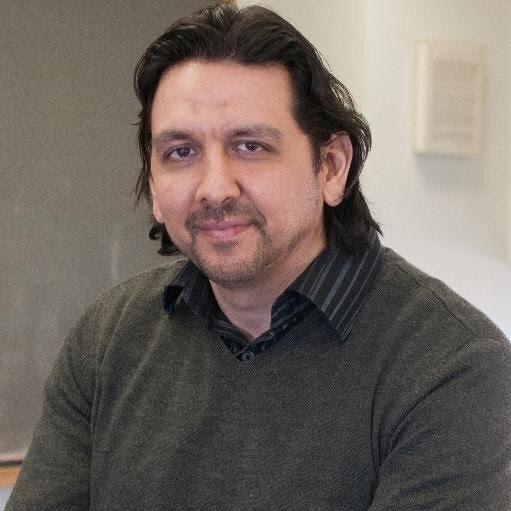
Trust the Process, Process "the Trump": Multilingualism and the Nativist Whitelash
On the morning of November 9, 2016, American citizens across the conventional political spectrum of liberal and conservative ideologies were shaken to their core. They had just elected a bombastic billionaire with no experience in conventional politics to the highest office in “the world.” A reality television star, speaking at a fourth grade reading level, with a penchant for saying “You’re Fired” and a voracious appetite for pomp and spectacle was about to get behind the wheel of the world’s biggest economy and have his hand on the trigger of planet earth’s most powerful weapons of mass destruction. In the subsequent weeks, many were asking, “What just happened?” “How did this happen?” “Why did this happen?” Television pundits, academics, clergy, Monday morning quarterbacks of all ilk murmured these questions privately and publicly seeking answers. Polls, statistical models, conventional discourse analysis, and typical “fact-checking” approaches were proven to be highly limited in understanding the stances of a seemingly evasive electorate during the 2016 campaign. Some immediately argued that the election of Trump was a “Whitelash,” a reactionary backlash to eight years of a Black President. Over the last few decades, linguistic anthropologists have argued the need to go beyond linguistic code (i.e. what is said?) in order to better understand how people make sense of their life-worlds across time and space. When it comes to bilingualism, many have argued that the history of the United States has often oscillated between nativism, restrictivism, and various forms of transitional bilingualism. In each epoch, English remained the undisputed dominant language and a de facto national language. Throughout this contentious history, bilingualism has generally been framed through the dominant gaze of monolingualism, Whiteness, and assimilationist language ideologies. In this presentation, I draw on an adaptation of language ideologies, the emerging field of raciolinguistics, and aspects of critical discourse analysis to understand how “Trumpism” and the “Trump” became icons of populism at this juncture of our nation’s history. I will draw on a linguistic corpus consisting of several major narrative events during the campaign and after the election. Finally, I will discuss implications for the state of bilingualism, bilingual education, and bilingual policy in our nation.
Aria Razfar is Professor of Literacy, Language, and Culture at the University of Illinois at Chicago. He is the Director of English Learning through Mathematics, Science, and Action Research (ELMSA) sponsored by the U.S. Dept. of Education’s Office of English Language Acquisition. He has published widely in premiere academic journals and he is author ofApplying Linguistics in the Classroom: A Sociocultural Perspective (Routledge Press, 2013).
Friday Afternoon Plenary - Jonathan Rosa, Ph.D.
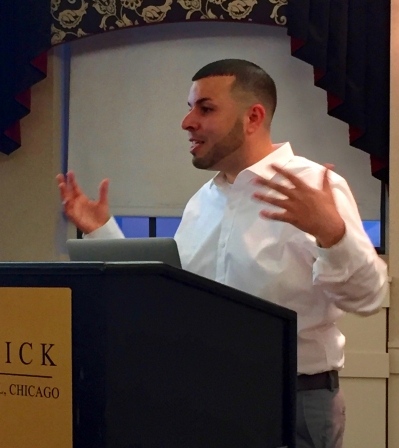
Community as a Campus: From Language “Problems” to “Possibilities” in Latina/o Communities
The language practices of U.S. Latinas/os are frequently viewed as educational impediments rather than skills. From such perspectives, Latina/o language use is framed as a handicap and scapegoated as the cause of educational underachievement, despite the fact that many Latinas’/os’ bilingual linguistic repertoires could be understood as more expansive than those of the monolingual teachers, administrators, and policy makers who seek to support them. This presentation points to exciting possibilities that emerge when we approach marginalized communities not as linguistically deficient, but rather as dynamically multilingual. It describes the development of a collaborative project bringing together a professor and undergraduate students with a teacher and students in a predominantly Latina/o high school. In this project, titled VOCES (Voicing Our Community in English and Spanish), the professor and high school teacher worked collaboratively as co-instructors and the university students and high school students worked collaboratively as co-learners. The goal of the project was to learn research skills to document and analyze the marginalization of particular language practices in a predominantly Latina/o community. Each university student partnered with several high school students and decided to focus on a particular research topic/methodology: (1) linguistic landscape; (2) ethnography of language; (3) oral history; (4) language policy; (5) slang; and (6) social media. Each group of students wrote a final report and presented their findings not only to one another, but also the superintendent of schools, as well as a group of teachers who were working to develop more culturally responsive curricula. By approaching this community as a campus, the students and instructors were able to work together to present an alternative view of a stigmatized community that highlights not only the vast challenges that it faces, but also the resilience and ingenuity of its residents.
Jonathan Rosa is Assistant Professor in the Graduate School of Education, Center for Comparative Studies in Race and Ethnicity, and, by courtesy, Anthropology and Linguistics, at Stanford University. His research analyzes the interplay between racial marginalization, linguistic stigmatization, and educational inequality. Dr. Rosa is author of the forthcoming book Looking like a Language, Sounding like a Race: Inequality and Ingenuity in the Learning of Latinidad (Oxford University Press). His work has appeared in scholarly journals such as the Harvard Educational Review, American Ethnologist, American Anthropologist, and the Journal of Linguistic Anthropology, as well as media outlets such as MSNBC, NPR, CNN, and Univision. Dr. Rosa received his M.A. and Ph.D. from the Department of Anthropology at the University of Chicago, and his B.A. in Linguistics and Educational Studies from Swarthmore College.
Saturday Morning Plenary - Graham Crookes, PhD
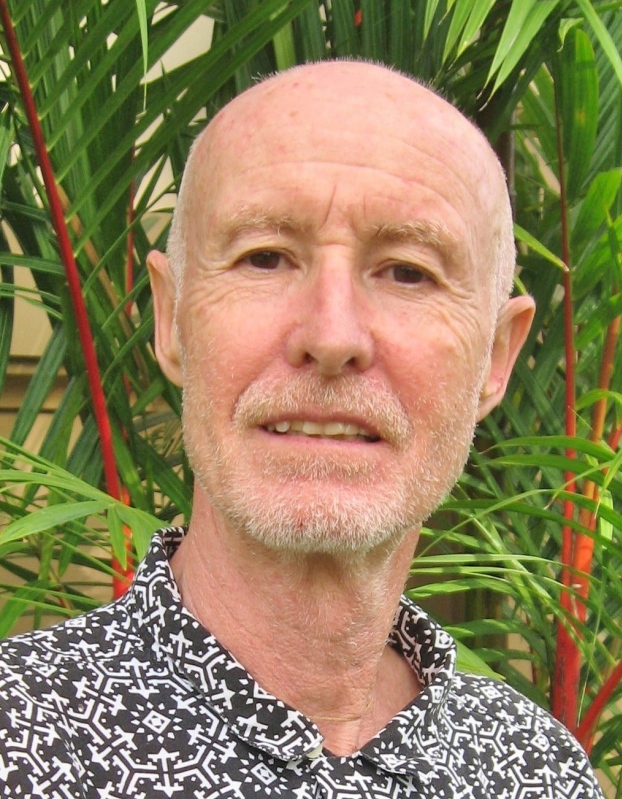
Orienting to Critical Language Pedagogy
Critical pedagogy is a long-standing perspective in education which provides practical suggestions for classroom practice and implications for teachers’ philosophies of teaching, based on a critique of society that favors equality, justice, and solidarity. In this presentation I review key ideas for language classroom practice arising from the tradition. They emphasize the active role of students, including in choice of content, in dialogue with a teacher who has a critical view of language, education, and society. I will refer to the values we need to identify when developing a philosophy of teaching that will be useful in a time of adversity. Philosophies of teaching should go beyond mere statements of methodological preferences and reflect personal values pertaining to the role of education in society. I will go over aspects of the action orientation of critical language pedagogy: its position is that teachers should engage with social movements and have one foot in the classroom and one foot in the wider world. I will refer to the domain of action and research known as “organizing”. How to organize is not part of (language) teachers’ normal pre-service or in-service education, though by now in Illinois that may already have been compensated for. In concluding, my emphasis will be on using critical language pedagogy as an orienting tool, so that even if it is difficult to move forward we will know that we are pointing in the right direction. This involves being willing to recognize the legitimacy of compromise (particularly in the face of overwhelming forces) and the need to preserve mental strength for a long struggle. My role as a presenter is not to speak from personal battle scars but to orient listeners to the professional resources that present a coherent and comprehensive alternative to what we are presently faced with.
Graham Crookes is Professor (and Chair), Department of Second Language Studies, University of Hawai’i. His recent book Critical ELT in action supports much of his plenary talk, backed up by his previous book Values, philosophies, and beliefs in TESOL. He has spent extended professional time in Malaysia, Japan, and Colombia, and currently hosts a number of visiting students from Brazil in his seminar on critical language pedagogy running for graduate students in the MA and PhD programs in his department. Originally from London, he has lived in Hawai’I since 1982, and is married with one school-age child.
Saturday Afternoon Plenary - Kathy Lobo
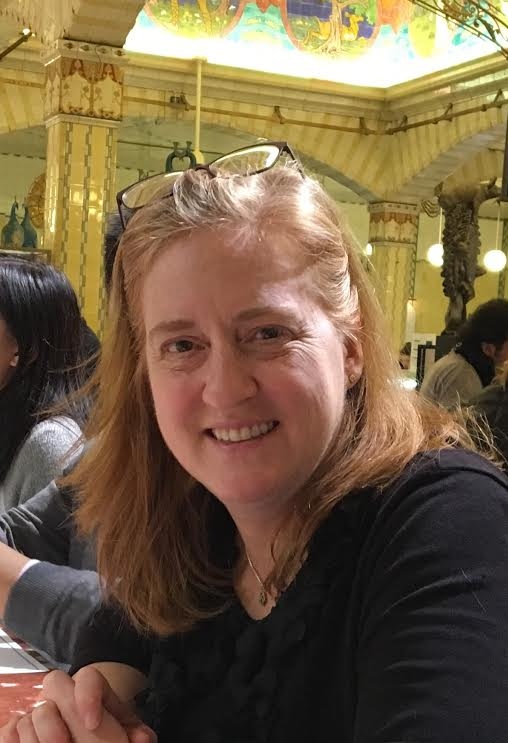
Reflecting on Engagement with TESOL: From Local Affiliate Member to International Conference Chair
In 2018 over 6500 TESOL professionals will gather in Chicago for the annual TESOL conference. Gain practical ideas for how to get involved and how to make the most of this special opportunity. Kathy Lobo, Conferences Professional Council Chair, TESOL International Association, will give a preview of the conference planning. Go beyond taking courses, joining professional organizations and attending regional or national conferences. Take advantage of opportunities to expand not only one’s knowledge but also one’s professional network. It is time to get ready because in less than 400 days it will all begin. Mark your calendar March 27-30, 2018!
Kathy Lobo is an ESL teacher at Newton South High School, and adjunct professor of education at Brandeis University in Massachusetts. She is past president of MATSOL, the Massachusetts TESOL affiliate and she has been actively involved in planning TESOL conferences since Boston TESOL 2010. Presently she is an associate chair for the Seattle TESOL 2017 conference and chair for Chicago TESOL 2018.
Featured Speakers
Alan Seaman, PhD
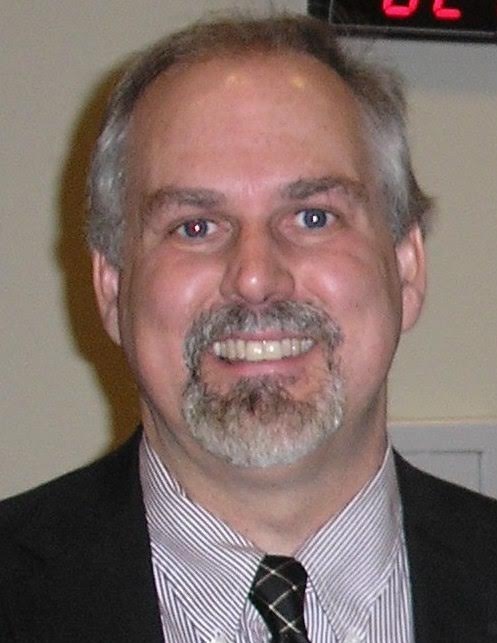
English Language Instruction for Children in the Global South
How are bilingual schools teaching English to children in the Global South? To answer this question, the presenter conducted extensive focus group interviews with teachers in Colombia and Indonesia. The results highlight a variety of creative techniques that can serve as a valuable resource for ELL teachers in the U.S.
Alan Seaman is a professor of TESOL in the Wheaton College Graduate School, where he teaches courses in applied linguistics and second language education.
Eric Bohman, Stacy Cameron, & Susanne McLaughlin
Life After COMPASS: Placement Testing in Higher Ed
Since the end of the COMPASS ESL Placement test in Fall 2016, many institutions in Higher Ed have had to quickly find replacements. This major adjustment has been difficult for institutions all around the United States and those in Illinois are no exception. At this session, coordinators from three institutes of Higher Education will discuss the various solutions to placement they chose after the end of the COMPASS, discuss those solutions, and take questions.
Eric Bohman oversees the testing and placement process for the Liberal Arts division of William Rainey Harper College including English, ESL, and World Languages. He holds a Doctorate in the Education and Master’s in Adult Education from National-Louis University, and a Certificate in International Education from the University of Stockholm. He has authored ESL texts and had his research on the decision-making process of international students to attend community colleges published.
Stacy Cameron is an Assistant Professor of English at Oakton Community College and is currently serving as the ESL Coordinator. She has been teaching ESL for over twenty years.
Susanne McLaughlin is the Director of the English Language Program at Roosevelt University in Chicago.
Carolyn Theard-Griggs, EdD
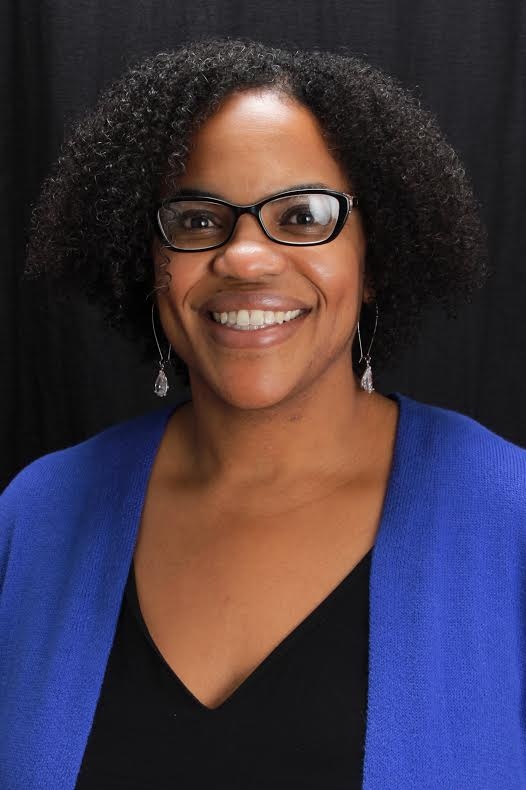
Empowerment through Agency: Students, Teachers, and Caregivers
We are currently facing challenging times in education. Students, teachers, and caregivers are faced with a unique opportunity to shift the conversation from compliance to empowerment. As teachers and teacher educators, we have to help stakeholders, involved in the education of English Language Learners, recognize their agency and how to act upon it. In this session, we’ll look at agency through the lens of advocacy, collaboration, capacity, and change. More specifically, questions that will guide our time include:
-
Advocacy. How is advocacy defined? How do we model advocacy for our students while leading as advocates in our community?
-
Collaboration. How do we set aside smaller differences to work together for the good of the whole? How do we guide those that have been marginalized to find their voice and use their power?
-
Capacity. How do we remove self-imposed limits? How do we prevent others from limiting us? What can and should we do individually and what can and should we do as a group?
-
Change. How do we build and maintain momentum that provokes the necessary change while sustaining our already achieved advances? Where and when does change start?
Wrestling with these questions can assist us in determining how we will repurpose and envision our work so that we can serve as models. Ultimately, we are responsible for the change we desperately need. This session will end with a discussion on the importance of all stakeholders understanding their role in enacting effective and sustainable change by embracing the importance of collective and individual efficacy. Participants with leave with practical ways of supporting student, teacher, and caregiver agency in this current political climate in hopes that we can respond to the following challenge: “If we are serious about fostering an environment that encourages our teacher candidates to take action and teach for change in the role as teachers, we must not only facilitate environments that encourage such practice, but also model what we envision in our own daily practice as teacher educators” (Gillette & Schultz, 2008, p. 236).
Dr. Carolyn Theard-Griggs is an Associate Professor at Concordia University Chicago and Department Chair of the Department of Teaching, Learning, & Diversity at Concordia University. As department chair, she is responsible for and provides oversight of the following Master’s and Doctoral level programs: ESL, TESOL, Special Education, Curriculum and Instruction, Teaching and Learning and Differentiated Instruction. Dr. Theard-Griggs holds an Ed.D. in Curriculum and Instruction from Loyola University. Prior to teaching in higher education, she was a classroom teacher, grades K-3, for ten years. She has also served as an instructional coach, team leader, and curriculum developer. Her research interests include parental involvement in schools, culturally responsive teaching, instructional coaching, teacher leadership and curriculum development.
Born to Haitian immigrants, in Chicago, Illinois, her first languages were French and Kreyol. Both of her parents came to the U.S. in the late 50s; her father a university professor, her mother a registered nurse. She was raised in a multilingual home.
Kat Jacobsen

Adjuncts—We Are the University: An orientation on contingency in higher education and the challenges faced by adjunct educators
Up to 75% of higher education faculty are considered contingent, non-tenure track educators, often holding adjunct status. The shift in hiring practices has taken place over a 40-year period and has reached critical levels, especially in foundational classes. Often, precarious positions are insecure, institutionally unsupported, and economically unstable, with low pay and no benefits or resources in or outside the classroom. Because of this, meeting the needs of the student can also be a challenge. Adjuncts take on many of the same responsibilities of full-time or tenure track professors, including faculty development and maintaining accreditation standards. They make themselves available to students outside class, even though they may not have an office. They have no assurance beyond good faith that they will still be working in the same capacity for the next academic term. Frequently, an adjunct needs to work at more than one job in order to earn a living wage, or to depend on the income of a spouse to make ends meet. Despite having worked for a school regularly for years, contingent educators often find that they have no voice within their institutions. While teaching the same classes and performing the same duties in the classroom, adjunct professors receive a fraction of what their full-time and tenure track counterparts receive--and yet students pay the same tuition fee, regardless of the teacher in the classroom.
Economic and political uncertainty have similar effects for both adjunct instruction and at-risk communities, including minority, bilingual, and ESL students. This presentation discusses the topic of adjunctification in higher education, the effect this reality has on both teachers and students, and why this needs to change. In short, bilingual and ESL student populations are often at-risk communities who need more support, not less. And if their professor is not supported, neither are their students.
Kat Jacobsen is the Creative Director of PrecariCorps, a 501(c)(3) dedicated to supporting adjunct faculty working in higher ed (all donations are tax deductible). She is an adjunct educator, and the daughter of an immigrant refugee and an ESL educator. The goal of her work through PrecariCorps and adjunct advocacy is to shift the tide for adjunct, contingent, and all other non-tenure track educators nationwide, and to create a more equitable, compassionate future for those who have dedicated themselves to educating others.
Rebecca Vonderlack-Navarro
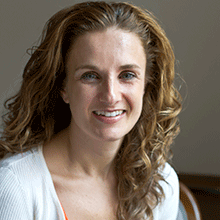
Every Student Succeeds Act and its Implications for English Learners
The Reauthorization of the Elementary and Secondary Education Act with the Every Student Succeeds Act has important policies that will influence the education of English Learners into the future. This interactive workshop provides a brief overview of the general changes to occur under ESSA followed by a deeper look at what it entails for English Learners. The workshop concludes with a discussion about the enduring opportunities and challenges posed by the law.
The Latino Policy Forum works to address issues facing Illinois schools who are serving a growing number of students who come from immigrant families, speak a range of home languages, have varying levels of English proficiency and/or whose families may be unfamiliar with how to navigate U.S. schools.
According to state-level census data, close to one in every four public school children speak a language other than English in the home. The number of students who identify as English Learners statewide—now close to one out of every 10 students— has grown an astonishing 83 percent over the last 15 years. As these students transition into general education classrooms, nearly every teacher in the state will likely be working with ELs at some point in their careers. Given their prominence in today’s schools, the Forum is encouraged that the U.S. Department of Education (the Department) is seeking to support the learning of ELs in various ways through the Every Student Succeeds Act.
Rebecca Vonderlack-Navarro works to advance policy supports and systemic change to bolster teacher preparation—both pre- and in-service—to meet the needs of the state’s diverse language learners. Her numerous speaking engagements, publications, and advocacy efforts provide thoughtful consideration about the interconnectedness of language, literacy and academic achievement. She has recently authored a brief series on how Illinois might prepare all teachers to education English Learners along with ways to make teacher licensure exams (edTPA) more responsive to language and cultural diversity. This work was informed by convening more than 40 stakeholders across the state with expertise in linguistically and culturally responsive education. Rebecca also provides immigrant parent workshops to discuss how heightened academic standards might influence English Learners. Rebecca is a state-appointed member of the Illinois Advisory Council on Bilingual Education.
Rebecca earned her PhD from the School of Social Service Administration at the University of Chicago. Her academic efforts were focused on the community organizing and bi-national political incorporation of Mexican immigrants in Chicago. Along with publishing a number of academic journal articles and book chapters, Rebecca’s dissertation was published as part of a book series, The New Americans, Recent Immigration and American Society, edited by Steven Gold and Ruben Rumbaut.
Prior to her studies at the University of Chicago, Rebecca was awarded a Fulbright scholarship to support qualitative research exploring the economic and political impact of a microcredit program on its participants at a community development agency located in Tegucigalpa, Honduras.
William Stone, PhD
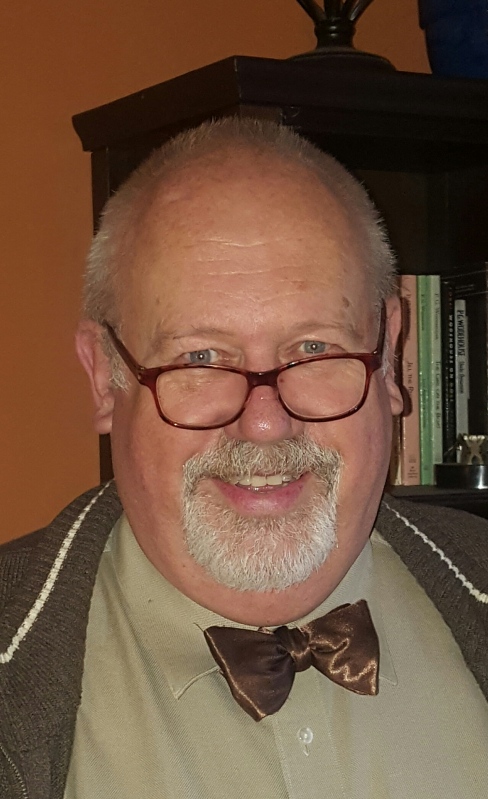
Big Bird Lied to You: The truth about nouns and noun phrases
One of the challenges faced by TESOL instructors today, whether they work with kindergarteners or adults, is the sad fact that much of the instructional material available to us seems to be completely unaffected by any research in the fields of Linguistics or TESOL in the past sixty years. A large part of what we find seems to have been written by people who received their grammar instruction from Sesame Street.
Most online and printed sources, describe a noun as “the name of a person, place or thing”. A few of the more rigorous sites and texts will add “idea”. I’ve also seen “concept” and “institution” added to the list. In this presentation, I will demonstrate why this definition is both erroneous and futile. While coming up with a grammar based definition of this grammatical entity (rather than a semantic one), I will also discuss better ways of teaching nouns and noun phrases to ELLs.
In addition, I will cover issues that teachers often experience with pronouns, possessives and the highly dubious gerund and look at ways we can bring the truth to our ELLs without overwhelming them.
William Stone taught EFL for six years in Tunisia at l’Université de Tunis, for four years in Qatar where he taught at the British Council, elementary and high school and for three years in the Sultanate of Oman where he taught for the Royal Guard. He taught ESL in Chicagoland for ten years at various universities and seminaries and at community college. He earned his Ph.D. in Linguistics from Northwestern University. He has worked in teacher training on the TESOL faculty of Northeastern Illinois University since 1999. His main interests are the natural pairing of grammar and humor.

Connect with us: